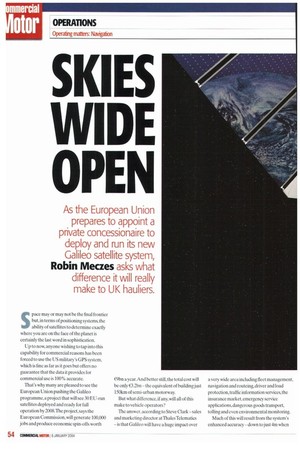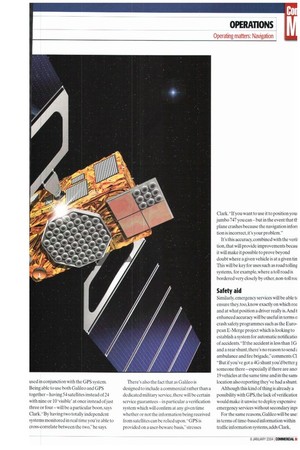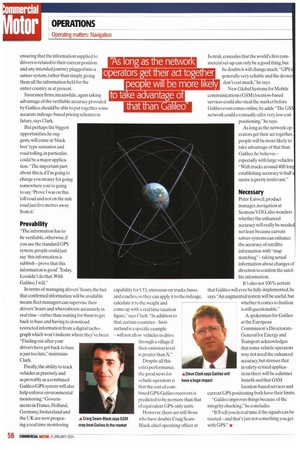SKIES WIDE OPEN
Page 54

Page 55

Page 56

If you've noticed an error in this article please click here to report it so we can fix it.
As the European Union prepares to appoint a private concessionaire to deploy and run its new Galileo satellite system, Robin Meczes asks what difference it will really make to UK hauliers.
Space may or may not be the final frontier but, in terms of positioning systems, the ability of satellites to determine exactly where you are on the face of the planet is certainly the last word in sophistication.
Up to now, anyone wishing to tap into this capability for commercial reasons has been forced to use the US military's GPS system, which is fine as far as it goes but offers no guarantee that the data it provides for commercial use is 100% accurate.
That's why many are pleased to see the European Union pushing the Galileo progranune, a project that will see 30 EU-run satellites deployed and ready for full operation by 2008.The project. says the European Commission, will generate 100,000 jobs and produce economic spin-offs worth €9bn a year. And better still, the total cost will be only €3.2bn the equivalent of building just 150krn of semi-urban motorway But what difference, if any, will all of this make to vehicle operators?
The answer, according to Steve Clark -sales and marketing director at ThalesTelematics is that Galileo will have a huge impact over a very wide area including fleet management, navigation and routeing, driver and load protection, traffic information services, the insurance market, emergency service applications, dangerous goods transport, tolling and even environmental monitoring.
Much of this will result from the system's enhanced accuracy -down to just 4m when used in conjunction with the GPS system. Being able to use both Galileo and GPS together—having 54 satellites instead of 24 with nine or 10 'visible' at once instead of just three or four—will be a particular boon, says Clark. "By having two totally independent systems monitored in real time you're able to cross-correlate between the two," he says. There's also the fact that as Galileo is designed to include a commercial rather than a dedicated military service, there will be certain service guarantees —in particular a verification system which will confirm at any given time whether or not the information being received from satellites can be relied upon. 'GPS is provided on a user-beware basis," stresses Clark."If you want to use it to position you jumbo 747 you can — hut in the event that tt] plane crashes because the navigation infon tion is incorrect, it's your problem."
It's this accuracy, combined with the veril tion, that will provide improvements becau it will make it possible to prove beyond doubt where a given vehicle is at a given tin This will be key for uses such as road tolling systems, for example, where a toll road is bordered very closely by other, non-toll ro2
Safety aid
Similarly. emergency services will be able tt ensure they.too, know exactly on which roa and at what position a driver really is. And t enhanced accuracy will be useful in terms o crash safety programmes such as the European E-Merge project which is looking to establish a system for automatic notificatio of accidents."If the accident is less than 10 and a rear shunt. there's no reason to send E ambulance and fire brigade," comments CI "But if you've got a 4G shunt you'd better g someone there—especially if there are anoi 19 vehicles at the same time and in the sam, location also reporting they've had a shunt.
Although this kind of thing is already a possibility with GPS, the lack of verificatiot would make it unwise to deploy expensive emergency services without secondary inpi For the same reasons. Galileo will be usei in terms of time-based information within traffic information systems, adds Clark, ensuring that the information supplied to drivers is related to their current position and any intended journey plugged into a satnav system,rather than simply giving them all the information held for the entire country as at present.
Insurance firms,meanwhile, again taking advantage of the verifiable accuracy provided by Galileo, should be able to put together some accurate mileage-based pricing schemes in future. says Clark.
But perhaps the biggest opportunities, he sug gests. will come in 'black box' type scenarios and road tolling, in particular. could be a major application."The important part about this is.if I'm going to charge you money for going somewhere you're going to say:'Prove I was on this toll road and not on the side road just five metres away from it.'
Provability
The information has to be verifiable, otherwise, if you use the standard GPS system, people could just say 'this information is rubbish — prove that this information is good'.Today. I couldn't do that. With Galileo, I will."
In terms of managing drivers' hours, the fact that confirmed information will be available means fleet managers can supervise their drivers' hours and whereabouts accurately in real time — rather than waiting for them to get back to base and having to download restricted information from a digital tachograph which won't indicate where they've been. "Finding out after your drivers have got back to base is just too late," maintains Clark.
Fmally, the ability to track vehicles as precisely and as provably as a combined Galileo/GPS system will also help enforce environmental monitoring."Govern ments in France, Holland, Germany, Switzerland and the LTIC are now proposing a real time monitoring capability for CO2 emissions on trucks, buses and coaches, so they can apply it to the mileage, calculate it to the weight and come up with a real time taxation figure," says Clark."In addition to that, certain countries — Switzerland is a specific example — will not allow vehicles to drive through a village if their emission level is greater than X."
Despite all this extra performance, the good news for vehicle operators is that the cost of combined GPS/Galileo receivers is predicted to be no more than that of equivalent GPS-only units.
However, there are still those who have doubts. Craig SearsBlack,chief operating officer at Isotrak, concedes that the world's first commercial set-up can only be a good thing, but he doubts it will change much. "GPS generally very reliable and the device don't cost much," he says.
New Global Systems for Mobile communications (GSM) location-based services could also steal the market before Galileo even comes online, he adds. "The GS network could eventually offer very low cost positioning," he says.
As long as the network operators get their act together, people will be more likely to take advantage of that than Galileo, he believes— especially with large vehicles. "With trucks around 401t Ion establishing accuracy to half metre is pretty irrelevant."
Necessary
Peter Eatwell,product manager,navigation at Siemens VDO,also wonders whether the enhanced accuracy will really be neede not least because current satnav systems can enhance the accuracy of satellite information with "map matching"— taking actual information about changes of direction to confirm the satellite information.
It's also not 100% certain that Galileo will ever be fully implemented, he says."An augmented system will be useful, but whether it comes to fruition is still questionable."
A spokesman for Galileo at the European Commission's DirectorateGeneral for Energy and Transport acknowledges that some vehicle operators may not need the enhanced accuracy, but stresses that in safety-critical applications there will be a distinct benefit and that GSM location-based services and current GPS positioning both have their limits.
"Galileo improves things because of the integrity checking," he concludes.
"It'll tell you in real time if the signals can be trusted — and that's just not something you get with GPS." •
















































































































































































